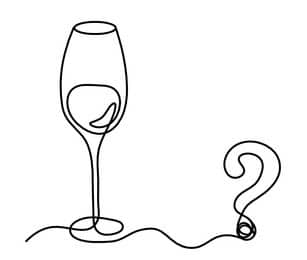Dariusz Galasiński: Wine ISN’T beyond words – writers need to try harder
By Dariusz Galasinski, 28 May 2025

3

My previous column, on wine writing, attracted critical attention. First on social media, then three experienced wine writers took me to task. Below I offer a response and keep arguing that wine writing is ordinary.
In discussions of wine writing difficulties, two arguments are usually made, often mixed up. One is that language is not enough – smell and taste vocabulary is limited, it can hardly describe wine. The other argument reverses the direction of reasoning. Wine is so complex that there is no language to describe it. Both arguments are flawed.
The first polemic was Jamie Goode’s “Is writing about wine difficult?”. He starts by arguing that to describe wine, you need to learn new vocabulary, then that the vocabulary is inadequate, proceeding to say that ‘we’ have to make it up. Dr Goode continues with research suggesting that people have trouble naming aromas, ending with the point that different languages have different aroma vocabularies.
The argument from neologisms is sensible; yes, you can invent new words. Yet, if you can make up words, surely, the inadequacy of language will vanish. Do wine writers hold back? And, more importantly, when would a vocabulary be sufficient? What yardstick could we apply to say: we now have enough aroma words? How do we know that, in contrast to aromas, we have enough vision words? The human eye can distinguish about 10 million colours but apparently, we are happy with the vision lexis. Go figure.
People’s inability to name aromas has nothing to do with language. Yes, it can be difficult. It can also be difficult to identify a colour or a sound. Is language inadequate here too? Should there be a word for the sound of a BMW engine? For Audi and Dacia too? Mechanics, accountants, or neurologists all learn new vocabularies, wine writers are hardly special. And the ‘perilous journey from perception to language’ tells us nothing about language but much about the idea of the wine writer’s bravery in the navigating the winding paths of wine assessment.
I do not know how the argument about cross-language differences contributes to discussions on wine writing. There are many cultural and socio-historical reasons for differences between languages but none lead to Jamie’s statement that ‘it would make sense to have an expanded language’. Do societies live in a state of permanent deprivation? Are societies simply collectively stupid for not developing more aroma words? And thank goodness, we have the wine writers making us aware of the needs we never knew we had. There is much research on linguistic relativism but none is about difficulties in writing about wine.
The other two texts, Joe Fattorini’s “The haunted glass” and Dwight Furrow’s “Is wine too complex for words?” start with wine. Fattorini, with his usual panache, argues for wine’s ‘ontological strangeness’ – wine is strange and amazing. Dwight Furrow concurs, writing that wine ‘moves – across the palate, across time, across contexts’. Joe adds that wine has the power to move people. And… I agree with both authors. Wine is wonderful, a part of humanity’s heritage offering extraordinary experiences. But verily, verily, this does not mean it cannot be written about.
As a linguist, I simply do not understand Prof. Furrow’s argument of noun-clinging language, preferring the representable. Moreover, language does nothing – it is lexis and rules how to use it, grammar. We are its source, our society and its culture; languages are embodiments of societies’ needs. Wine writing is not outside the social world and how we speak and write is only on us. If you do not like the stabilising nouns, use the dynamism of verbs but do not blame language for how you write.
If you are moved by wine, as Fattorini rightly says, your task is to move me with your writing. And there is so much writing that moves; also wine writers are capable of writing to move. But strings of descriptors, which are mostly (functional) adjectives, not nouns, are unlikely to do it. Perhaps it is time re-assess wine writing priorities and raise the bar?
Furthermore, wine writing is common. Just three popular wine services are responsible for over a million (sic!) tasting notes and thousands of articles on wine. The ineffable wine is surprisingly easily dragged to effability – sometimes with so much skill! Just read Tamlyn Currin, Andrew Jefford or Oz Clarke – their writing is extraordinary. But they are not superheroes breaking the barrier of noun-clinging, going where no one has gone before in language and wine. They simply write well. Somehow, language is enough.
Wine writing is not hard, good wine writing is. Wine writing is ordinary, we do not need more language. Arguments about language insufficiency only serve wine writers’ exceptionalism. Let us all be in awe of the valiant wine writer, selflessly going to battle with language, fearlessly facing the perils of wine tasting. Complaints about insufficient language have no basis in linguistics or in empirical evidence.
The wine writer’s superpower is in being useful. When you taste thousands of wines yearly, also on my behalf, you provide me with invaluable and much appreciated service. When I enjoy your stories, you provide me with an aesthetic experience and expand my world. Language is enough, your heroism is not necessary. Just write well.
- Dariusz Galasiński is a linguist and professor at the University of Wroclaw in Poland. He has been writing on experiences of mental illness and suicide. He also drinks wine and does research into how it is spoken about both by amateurs and professionals.







Melvyn Minnaar | 28 May 2025
Excellent.
Dariusz Galasinski | 28 May 2025
Thank you so much! I do appreciate it!
Marcelo Solá | 29 June 2025
Very clear and insightful. Thanks!